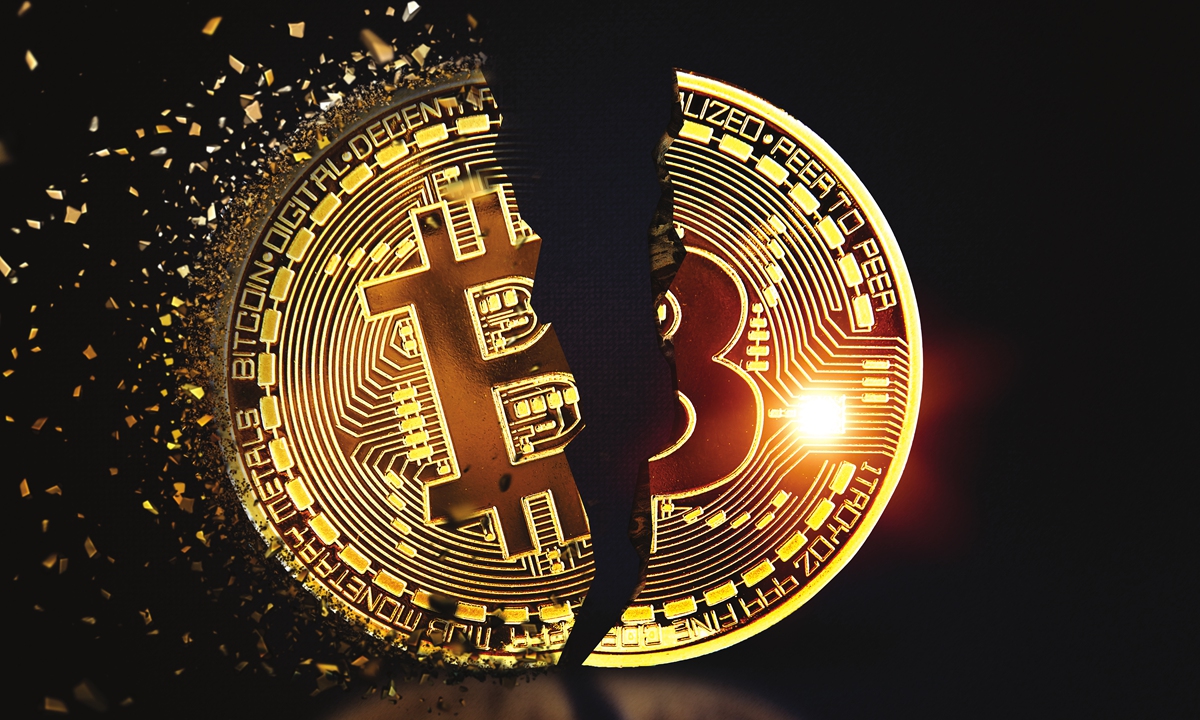The unemployed 30-year-old had spent his savings building a system to generate the cryptocurrency in the summer of 2020, but rolling blackouts and a police crackdown in his native Abkhazia forced him to pull the plug early, missing out on a potential fortune.

A view of a damaged bitcoin Illustration: VCG
“I am looking at bitcoin prices now and I want to cry,” said Inal, who asked for anonymity, in a phone interview.
Inal is one of the estimated hundreds of Abkhaz who joined a cryptocurrency craze that swept the Black Sea territory in 2020, sparking an energy crisis that local authorities are struggling to buck.
The power cuts have highlighted the energy cost of cryptocurrencies at a time when global interest in virtual cash is booming and bitcoin, the original and most popular virtual currency, is gaining acceptance among mainstream investors.
Bitcoins are generated in a process called “mining,” in which a global network of computers competes to solve complex algorithms.
These computers require abundant energy to run, with climate experts voicing concerns about cryptocurrencies’ potential to derail efforts to tackle global warming.
The issue of high energy consumption has recently come to the fore in Abkhazia, a lush strip of land once the playground of the Soviet elite, that broke away from Georgia in the early 1990s, after the collapse of the Soviet Union.
With a population of about 240,000, Abkhazia has seen at least 625 crypto farms mushroom in just the past few years, according to estimates from its economy ministry.
Yet residents believe the number to be much higher, with many families running small-scale operations that are hard to track.
‘Profitable business’
Abkhazia’s crypto boom, which started in 2016, is rooted in its particular geopolitical situation, according to Hess.
The territory is recognized as an independent state only by Russia, which has a military presence there, and a handful of other nations. The rest of the world still considers it part of Georgia.
This has left it largely isolated and underdeveloped, said Hess.
“Abkhazia faces substantial issues at attracting any kind of foreign investment or growing its local economy,” he told Reuters.
As a result, cryptocurrencies, which operate outside the traditional banking system, have become “highly popular,” spurred on by Abkhazia’s extremely low energy prices, said Hess.
The cost of one kilowatt-hour (kWh) in Abkhazia, is about $0.005, 10 times cheaper than in Georgia and 20 times less than the US average.
“Mining, it’s a very profitable business,” said Inal, who noted his mining venture brought in almost $5,000 a month.
Blackout
Inal had been out of a job for more than two years when, in August 2020, he scraped together $20,000 with two friends to buy 50 computer processors and set up a shop in an abandoned house near Sukhumi.
The government lifted its ban on cryptocurrency mining in September, asking miners to register and pay higher electricity fees instead – something that, along with rising bitcoin prices, pushed many others to join the crypto gold rush, Inal said.
By November 2020, Inal and his partners had covered about 80 percent of their investment.
Then things took a dark turn – literally.
In mid-November 2020, Abkhazia’s energy company Chernomorenergo was forced to introduce rolling blackouts to avoid what its chief engineer described as an “energy collapse.”
Government figures show that energy consumption had increased by an estimated 20 percent in 2020, adding to a 30
percent increase already registered since 2016.
As winter approached, electricity lines got so overloaded that some power stations caught fire – in one case leaving large parts of Sukhumi in the dark for more than a day, according to Chernomorenergo.
“It was the most challenging period for all of us,” said Dimitry, a Sukhumi resident who requested anonymity. In December 2020, the dam that provides the territory with most of its power was scheduled to close for repairs, with the government making a second U-turn, banning cryptocurrency mining again.
Law enforcement agencies went on the hunt for crypto farms, raiding homes, attics, shuttered factories, garages, and even restaurants, and cutting the power cables to mining processors they found, according to the interior ministry.
Hopes dashed
Inal said he and his partners pulled the plug ahead of the crackdown, in late November, as public anger grew over the continuous power cuts.
That left them a few thousand dollars short of breaking even on their investment. Others are facing even greater losses, he said.
“Some sold their cars; others made debts they can’t repay. It’s a really big problem,” he said.
While law enforcement raids brought some relief, energy consumption has been rising again, President Aslan Bzhania told a cabinet meeting in February.
Some miners simply reconnected their farms to the grid after being raided by the police, since currently there are no penalties for mining illegally, Inal said.
The local parliament is discussing a new law that would allow police to seize cryptocurrency mining equipment, impose hefty fines on anyone who flouts the ban, and slap criminal charges on those consuming more than 1 megawatt of energy.
Meanwhile, bitcoin rose above $50,000 to a new record high in February “First [the government] legalized the business and now they want to make people who mine criminals,” he said. “It’s unfair, it’s very unfair.”




